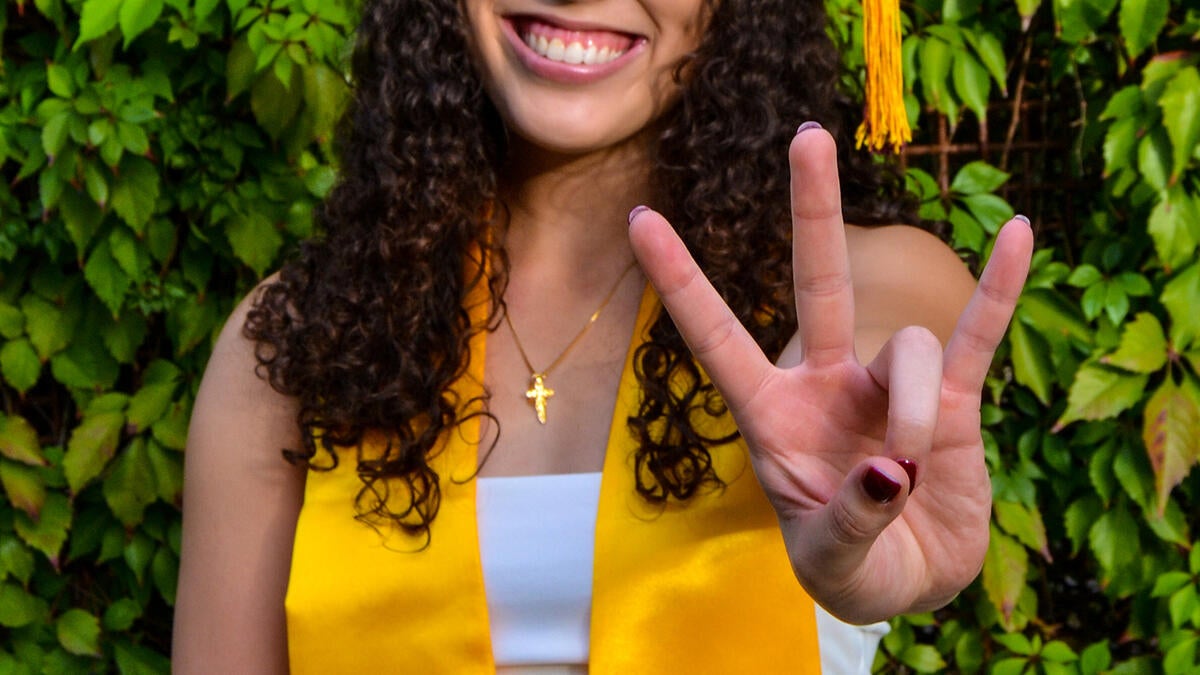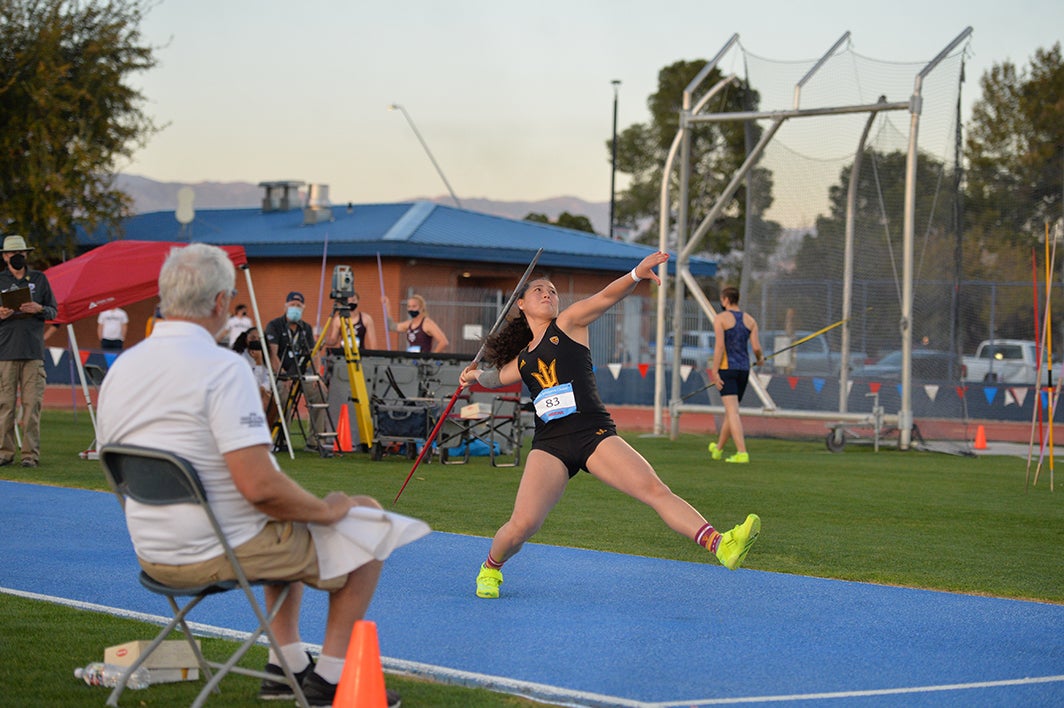Scholar-athlete aspires to share her love of math, sports as a teacher, coach

Cerah Moren will graduate with a Bachelor of Science degree in mathematics (secondary education).
Editor's note: This story is part of a series of profiles of notable fall 2021 graduates.
Cerah Moren graduates this week with a Bachelor of Science degree in mathematics with a concentration in secondary education from the School of Mathematical and Statistical Sciences. She is also a scholar-athlete and throws javelin for the ASU track and field team.
Moren grew up in Turlock, California. Her father is a high school mathematics teacher who also coaches football and track, and her mother is a registered nurse and manager at a dialysis center where she continues to educate other nurses in the program.
“There was not much to do in town, so instead my brothers and I were surrounded by sports, and the motivation to excel in our education,” she said.
As a young girl, Moren's father encouraged her to try every track and field event and she instantly fell in love with javelin, which became an important part of her life.
In high school she was driven to get high grades while balancing the life of a multisport athlete. She was surrounded by a supportive family, driving her to track meets or basketball practices, and providing help with her classes when needed. Moren chose to come to Arizona State so she could work with Brian Blutreich, the throws coach for ASU’s track and field team.
“I came in my first year super excited to train and compete at the collegiate level — but then halfway through my freshman year I got injured and tore the UCL (ulnar collateral ligament) in my throwing arm,” Moren said. “Coach Blutreich has been a great coach over these past few years. He's worked to help get me back stronger to continue to improve each year after my surgery.”
At the last Pac-12 meet in May, Moren’s throw of the women’s javelin went 48.24 meters, a personal record.
“Balancing school and sports was a difficult task, especially being a mathematics major. My undergrad consisted of a lot of planners, to-do lists, long days and scheduling in order to balance everything,” Moren said.
As a collegiate athlete Moren spends many hours a week throwing, weightlifting or doing drills. During her usual training weeks, a typical day consisted of waking up early, going to morning practice, then getting a quick lunch before her evening classes. After class she usually would go home to shower, eat dinner and study or do homework before falling asleep.
Cerah Moren throws the javelin at a track and field meet. Photo courtesy of William Edmonds
While attending ASU, Moren earned a Go Teach Tuition grant from the College Football Playoff Foundation supporting student-athletes looking to become teachers.
“I had a great experience here in the School of Mathematical and Statistical Sciences at ASU. I had a lot of really good mentors and support from all of my professors and advisors. They all wanted to see me succeed,” she said. “The program was very in depth and provided me with great knowledge and techniques.”
“Cerah’s experiences in the BS (with secondary certification) has had a sustained focus on understanding, learning and teaching ideas from algebra I through calculus,” said Marilyn Carlson, professor of mathematics education. “The insights she has gained about the longitudinal development of ideas will enable her to scaffold instructional sequences to be coherent and meaningful for students. Her future students will no doubt benefit from her experiences of making sense of student thinking, and her commitment to support her students in becoming confident and competent mathematical thinkers.”
Moren said she would definitely recommend the mathematics (secondary education) program to other students who wish to pursue a career in teaching math. As part of the program, Moren did her student teaching at Chaparral High School in Scottsdale, Arizona, where she taught freshmen through seniors in geometry, algebra 2 and algebra 3. She enjoyed her time with the students as she helped them learn the material through a different perspective.
“By getting her degree in mathematics she will have more options for her continued education toward a master’s and advancing to teach AP mathematics courses,” Carlson sai.
“I’m glad that I chose this program as it has provided me lifelong mentors, lifelong friends and a vast amount of knowledge that I get to continue to implement in my own future career of teaching,” Moren said.
After graduation Moren plans to pursue a master’s degree and finish her athletic eligibility here at ASU. We asked her to share more about her experiences as a Sun Devil.
Question: What was your “aha” moment, when you realized you wanted to study the field you majored in?
Answer: I realized in high school that I enjoyed helping others understand new concepts, in math and also new techniques in sports, that they were trying to learn. Helping others get that lightbulb moment was a great feeling that helped me realize I wanted to continue helping others reach their “aha” moments.
Q: What is something you learned while at ASU — in the classroom or otherwise — that surprised you, that changed your perspective?
A: Something I learned here at ASU that changed my perspective is that in becoming a teacher, we have to constantly self-reflect and continue to learn more about what is best for our students and what we can do as teachers to continue to make learning the material fun and meaningful. This is an important lesson that I learned throughout this program at ASU as it helps me constantly think and discover more techniques or activities that can be applied in my own classroom to help make the learning more meaningful for my future students.
Q: What do you like most about mathematics?
A: I like mathematics because math is unique in the fact that the problem-solving skills you develop in any math class are useful skills which can be carried over into our everyday lives. With my career in teaching, I hope to help high school students realize this and learn to have fun when learning about new mathematical concepts.
Q: Which was your favorite math class at ASU and why?
A: My favorite math class at ASU was MAT 207: Algebra and Geometry in the High School with Marilyn Carlson because this class helped me learn new techniques towards helping students learn new mathematical concepts at a more meaningful level.
Q: What is the best piece of advice you would give to those still in school?
A: The best piece of advice I could give to those still in school would be don’t feel like you have to have it all figured out right away. School and life can be full of ups and downs, but life is a continuous journey of learning and growing as a person. Take the time to enjoy that journey.
Q: What was your favorite spot-on campus, whether for studying, meeting friends or just thinking about life?
A: My favorite spot-on campus that I would go to for studying or waiting in between classes was in the little courtyard at the Farmer Education Building.
Q: What do you like to do in your spare time for fun?
A: For fun I like to explore scenic places, like hiking or any art festivals, throughout the Tempe and Scottsdale area.
Q: What do you think is most misunderstood about math by the general public?
A: I think the most misunderstood concept about math is that most people work through math problems just to reach a desired answer. I think math is unique in the fact that the problem-solving skills that you develop in any math class are useful skills that can be carried over into our everyday lives.
Q: If someone gave you $40 million to solve one problem on our planet, what would you tackle?
A: The one problem that I would help solve on our planet would be poverty.
More Science and technology

ASU professor wins NIH Director’s New Innovator Award for research linking gene function to brain structure
Life experiences alter us in many ways, including how we act and our mental and physical health. What we go through can even…

ASU postdoctoral researcher leads initiative to support graduate student mental health
Olivia Davis had firsthand experience with anxiety and OCD before she entered grad school. Then, during the pandemic and as a…

ASU graduate student researching interplay between family dynamics, ADHD
The symptoms of attention deficit hyperactivity disorder (ADHD) — which include daydreaming, making careless mistakes or taking…
